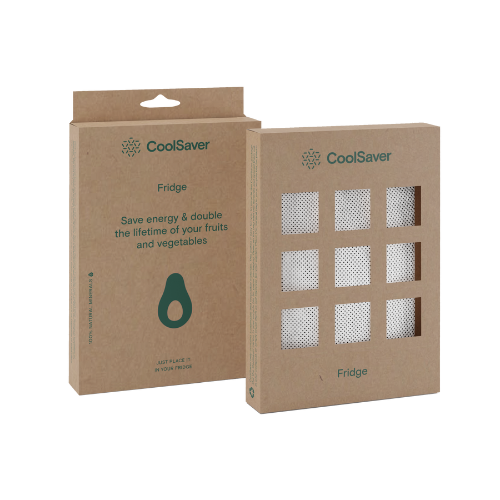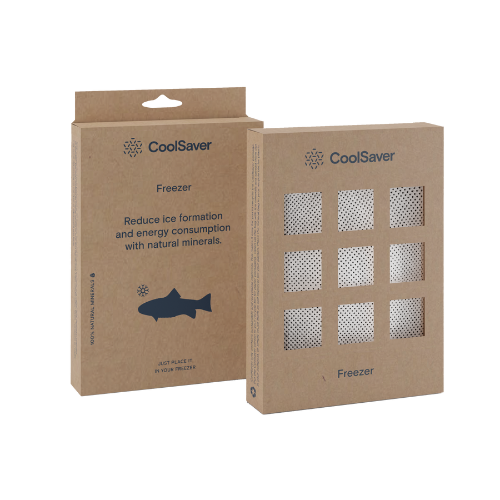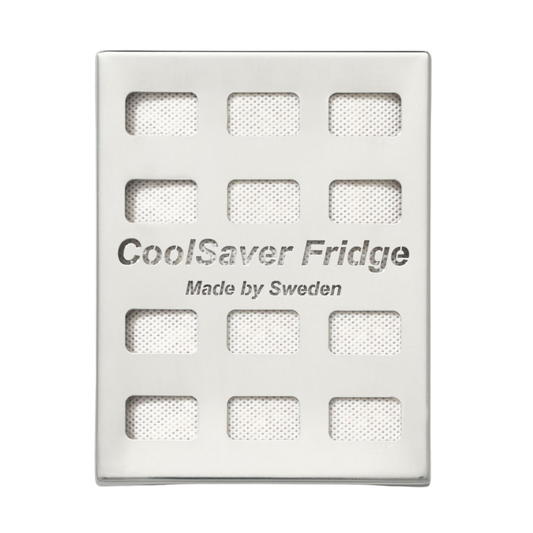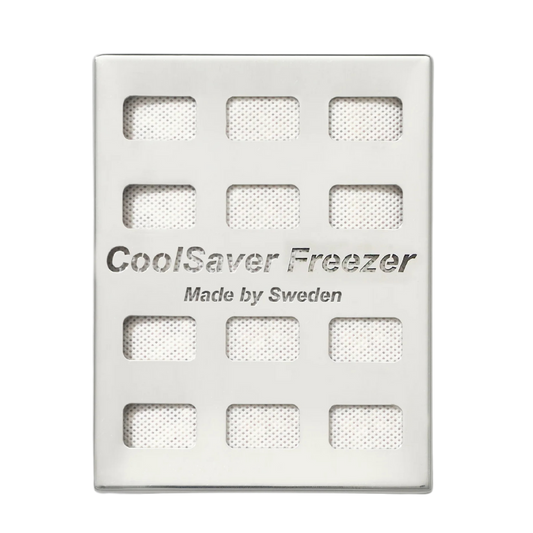Perguntas frequentes
Como os painéis podem reduzir o desperdício ?
O etileno é um gás natural produzido por frutas, vegetais e plantas. Ele acelera o processo de maturação e é a razão pela qual as bananas ficam marrons, as flores murcham e os vegetais estragam. A solução da CoolSaver remove o conteúdo de etileno do ar quase completamente. As lojas têm menos desperdício e os clientes recebem produtos com maior qualidade e longevidade.
O crescimento de mofo só ocorre em ambientes úmidos. Ao reduzir a condensação, podemos, portanto, reduzir a potencial formação de mofo na geladeira. Aliás, todos os alimentos durarão mais devido ao ambiente otimizado com temperaturas mais uniformes.
Qual é a diferença entre Coolsaver e outros produtos absorventes ?
Os minerais CoolSaver não absorvem a umidade, mas, em vez disso, tratam as moléculas de água em um nível químico de superfície, o que impede que as moléculas mudem de umidade para condensação. Isso também é chamado de filtragem molecular. Em uma geladeira, por exemplo, você quer preservar a umidade, mas evitar a condensação que tem um efeito negativo quando ocorre no ambiente da sua geladeira e freezer.
A CoolSaver tem ajudado empresas como McDonalds, Polfärsk e Whirlpool por mais de 10 anos a melhorar seus ambientes de freezer e refrigerador na forma de economia de energia, redução de desperdício de alimentos e redução de problemas relacionados à condensação. Veja nossos vídeos de referência com alguns desses clientes empresariais aqui: https://coolsaver.com/en/references/
A CoolSaver, em conjunto com o Instituto Estatal Sueco de Testes (SP), realizou testes independentes em refrigeradores e freezers domésticos, que são a base para os resultados aos quais nos referimos na forma de economia de energia e aumento da vida útil de frutas e vegetais.
Mais informações sobre Química de Superfície: Ver PDF
O crescimento de mofo só ocorre em ambientes úmidos. Ao reduzir a condensação, podemos, portanto, reduzir a potencial formação de mofo na geladeira. Aliás, todos os alimentos durarão mais devido ao ambiente otimizado com temperaturas mais uniformes.
Como Coolsaver economiza energia ?
Por meio de um processo químico de superfície, o CoolSaver previne e reduz a condensação e facilita a manutenção de temperaturas baixas e uniformes no refrigerador e no freezer, o que resulta em economia de energia. Condensação significa mais consumo de energia para resfriamento e também risco de formação de gelo.
A CoolSaver tem ajudado empresas como McDonalds, Polfärsk e Whirlpool por mais de 10 anos a melhorar seus ambientes de freezer e refrigerador na forma de economia de energia, redução de desperdício de alimentos e redução de problemas relacionados à condensação. Veja nossos vídeos de referência com alguns desses clientes empresariais aqui: https://coolsaver.com/en/references/
A CoolSaver, em conjunto com o Instituto Estatal Sueco de Testes (SP), realizou testes independentes em refrigeradores e freezers domésticos, que são a base para os resultados aos quais nos referimos na forma de economia de energia e aumento da vida útil de frutas e vegetais.
Mais informações sobre Química de Superfície: Ver PDF
O crescimento de mofo só ocorre em ambientes úmidos. Ao reduzir a condensação, podemos, portanto, reduzir a potencial formação de mofo na geladeira. Aliás, todos os alimentos durarão mais devido ao ambiente otimizado com temperaturas mais uniformes.
A tecnologia de Coolsaver está comprovada para funcionar ?
Uma das objeções mais comuns que recebemos antes de nossos clientes comprarem os produtos é "Isso parece bom demais para ser verdade!". É claro que estamos felizes que nossos produtos tenham um efeito tão bom que essa pergunta é feita. No entanto, é importante informarmos aos nossos clientes de onde surgem os efeitos no CoolSaver.
A CoolSaver tem ajudado empresas como McDonalds, Polfärsk e Whirlpool por mais de 10 anos a melhorar seus ambientes de freezer e refrigerador na forma de economia de energia, redução de desperdício de alimentos e redução de problemas relacionados à condensação. Veja nossos vídeos de referência com alguns desses clientes empresariais aqui: https://coolsaver.com/en/references/
A CoolSaver, em conjunto com o Instituto Estatal Sueco de Testes (SP), realizou testes independentes em refrigeradores e freezers domésticos, que são a base para os resultados aos quais nos referimos na forma de economia de energia e aumento da vida útil de frutas e vegetais.
Mais informações sobre Química de Superfície: Ver PDF
O crescimento de mofo só ocorre em ambientes úmidos. Ao reduzir a condensação, podemos, portanto, reduzir a potencial formação de mofo na geladeira. Aliás, todos os alimentos durarão mais devido ao ambiente otimizado com temperaturas mais uniformes.
Os produtos mais legais
-
Painel de geladeira - comida fresca
Preço normal 299,00 krPreço normalPreço unitário / por -
Painel de freezer - Redutor de energia e gelo
Preço normal 299,00 krPreço normalPreço unitário / por -
Painel da geladeira - comida fresca (aço)
Preço normal 499,00 krPreço normalPreço unitário / por -
Painel do freezer - Redutor de energia e gelo (aço)
Preço normal 499,00 krPreço normalPreço unitário / por
Você também pode gostar
Ver tudo-
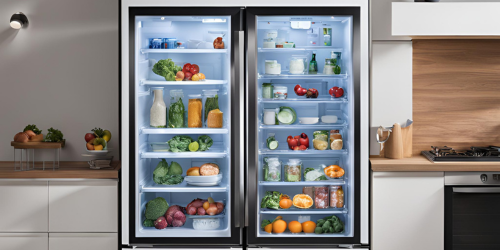
Qual é a melhor temperatura da geladeira para a...
Sua geladeira é uma das ferramentas mais essenciais para manter seus alimentos frescos e seguros. No entanto, muitos de nós não pensamos muito sobre a temperatura exata em que ela...
Qual é a melhor temperatura da geladeira para a...
Sua geladeira é uma das ferramentas mais essenciais para manter seus alimentos frescos e seguros. No entanto, muitos de nós não pensamos muito sobre a temperatura exata em que ela...
-

Economia fácil de energia: dicas simples para s...
Economizar energia em casa não é bom apenas para o meio ambiente, mas também ajuda a reduzir suas contas de serviços públicos. Com o aumento dos custos de energia e...
Economia fácil de energia: dicas simples para s...
Economizar energia em casa não é bom apenas para o meio ambiente, mas também ajuda a reduzir suas contas de serviços públicos. Com o aumento dos custos de energia e...
-
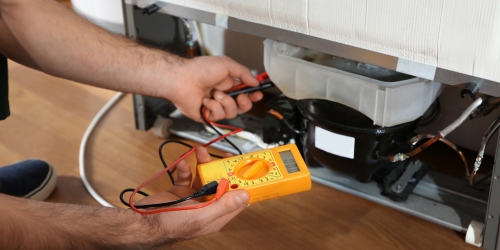
Problemas comuns de geladeira e freezer - como ...
Geladeiras e freezers são eletrodomésticos essenciais em qualquer cozinha, mas podem apresentar problemas que interrompem seu desempenho. Dois dos problemas mais pesquisados são resfriamento ruim em geladeiras e acúmulo excessivo...
Problemas comuns de geladeira e freezer - como ...
Geladeiras e freezers são eletrodomésticos essenciais em qualquer cozinha, mas podem apresentar problemas que interrompem seu desempenho. Dois dos problemas mais pesquisados são resfriamento ruim em geladeiras e acúmulo excessivo...

